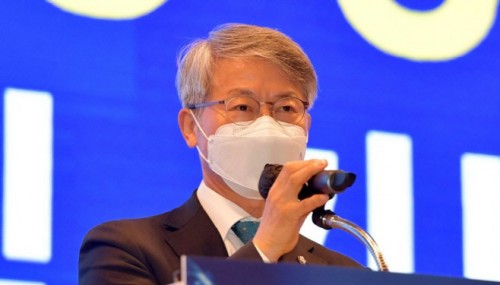 |
| Rep. Min Hyung-bae of the ruling Democratic Party (DP) gives a greeting at the ‘National Assembly Forum for Growth and Fairness in Korea’ held at the Korea Federation of Small and Medium Businesses Headquarter in Yeouido, Seoul, on May 20, 2021./ Source: Yonhap News |
AsiaToday reporter Jeong Geum-min
The ruling Democratic Party has brought up the big guns called ‘disguised party withdrawal’ of Rep. Min Hyung-bae in an attempt to help pass bills stripping the prosecution of its investigative powers. The ruling party has changed the composition of the Legislation and Judiciary Committee of the National Assembly to pass the prosecution reform bill at a plenary session at the National Assembly within this month.
The ruling party on Wednesday submitted a request for the convening of the Legislation and Judiciary Committee’s Agenda Mediation Committee immediately after Rep. Min Hyung-bae left the party, receiving fierce criticism of using an absolute majority in the National Assembly to neutralize the legal resistance of the opposition bloc.
Initially, the DP caused controversy by transferring Rep. Yang Hyang-ja from the Planning and Finance Committee to the legislation committee earlier this month while transferring Rep. Park Sung-joon from the legislation committee to the planning committee. The idea was that if a strong confrontation between the ruling and opposition parties continued in the judiciary committee, the ruling party would set up an agenda mediation committee and pass the bill with the cooperation of Rep. Yang. But when Yang issued a statement expressing opposition of bill to separate the prosecution’s powers to indict and investigate, the ruling party changed its ‘player’ again. The mediation committee is composed of three lawmakers from the ruling party, two from the opposition, and one independent lawmaker. If more than two thirds of the six members approve an agenda, it can be brought directly to a plenary session.
“I am taking up courage to give support to the normalization of the prosecution through separation of prosecution’s powers to lead investigations and indict suspects,” Rep. Min wrote on his Facebook. “It is an unfamiliar and scary way ahead. Please hold my hand so that I don’t get lonely.”
The move triggered a strong backlash from the main opposition People Power Party (PPP) and minor progressive Justice Party. PPP floor leader Kweon Seong-dong held an emergency press conference at the National Assembly, and said, “(Min’s party withdrawal) is an unacceptable trick to bring down the agenda mediation committee. I ask National Assembly Speaker Park Byeong-seung to forcibly resign and appoint a lawmaker from other party in accordance with the number of standing committee members.”
“The Democratic Party set up an agenda coordination committee aimed at reflecting the voices of minority party when they were a minority party. But when they became a ruling party, they completely ignored opinions from minority and tried to neutralize the agenda mediation committee,” he said. “This is legislative dictatorship.”
“When appointing Rep. Yang, Park justified that it was to bring together 11 from the DP, 6 from the PPP, and one from non-negotiating group, which is the essence of the judiciary committee when the 21st National Assembly opens,” he said. “But this time, Rep. Min has left the party.”
“The DP called the nomination of Justice Minister nominee Han Dong-hoon a terrorist attack on the public. Min’s party withdrawal is a terrorist attack on democracy of the National Assembly,” said Rep. Jang Tae-soo, spokesperson of the progressive Justice Party.
#Democratic Party #legislation committee #prosecution reform #Min Hyung-bae
Copyright by Asiatoday
Most Read
-
1
-
2
-
3
-
4
-
5
-
6
-
7





















